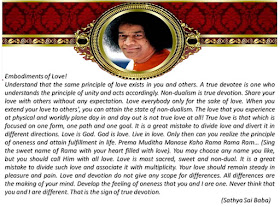Sutra 48. Yah Karmaphalam tyajati, karmam sannyasyati tato nirdwandwo bhavati.
[He who renounces the fruits of his actions, and who
renounces all actions goes beyond the pairs of opposites (such as pleasure and
pain, good and bad, heat and cold)].
Yah: who
Karmaphalam: the fruits of actions
Tyajati: gives
Karmani: actions
Sannyasyati: renounces
tatah: then, there by
Nirdwandwah: free from pairs of opposites (such as
pleasure and pain, good and bad, heat and cold)
Bhavati: becomes.
When the devotee feels that he is an instrument in the
hands of God, he renounces doership and agency. When the devotee does total
self-surrender, God destroys his ego and begins to act through his organs. Now
the devotee is freed from the pairs of opposites.
“All actions” mean here selfish actions (Kamya Karmas).
One should renounce selfish actions. Life is not possible without some kind of
activity. Selfless activities must be continued.
When the devotee dedicates the fruits of all his actions
and the actions themselves to the Lord, he is freed from the effects of
virtuous and vicious deeds. He is not affected in the least by pleasure and
pain resulting from the pain or loss of the results of actions. Such a devotee
is beyond the effects of the Gunas. He is ever immersed in the remembrance of God. Selfish actions have no attraction for him.
 Initially, this surrender bhavana has to be cultivated and the devotee needs to call God and announce / share that he is taking up actions that are required in this world without selfishness and is dedicating the fruits of such actions to God.
Initially, this surrender bhavana has to be cultivated and the devotee needs to call God and announce / share that he is taking up actions that are required in this world without selfishness and is dedicating the fruits of such actions to God.
All this deliberations are there as long as the devotee recognizes the following:-
- Physical identity of the devotee.
- Need for taking up actions, which follows his identity of himself.
- Conscious of not acting selfish, which follows from the earlier 2 points.
- Identity of God as an entity, as a power separate from himself.
- Invoking God and sharing that he has / is acting selflessly. This follows all the earlier points.
Ultimately, all the above 5 points are gone ONLY when the devotee does act, but in his parama prema for God, immersed in his love for God, the acts are done without any cognition of such acts, exactly as we start the car and reach our office, without even slightest of thought about the route from rest to office.
To be aware of the 5 points above, the devotee has to be conscious of his identity. When the identity itself is dissolved in the ocean of God's love, then who is acting, who is renouncing the fruit of one's actions and to whom one is surrendering the fruits of his actions.
In one line, if this state has to be expressed, then this is the state where,
"The surrenderer, in the culmination of his surrender, has surrendered the surrendering though also and hence, the surrenderer, per say, stands fully surrendered so that there is neither the surrenderer, nor the God, nor the actions to be surrendered. All that exists is LOVE/ GOD, as both expression is the same".
Once this identity crops up, then like Guru, Devi, Sai, Rama, Krishna, Sarva dharma bhajans follow, all likes and dislikes, fear, selfish thoughts / actions propelled by attachment / hatred / fear etc. will come automatically, one by one.
Let there be silence, says the author. No three Aumkaars even, only silence, supreme silence. Similarly, no identity of oneself has to be there and only silence prevails and PURE , EVER FLOWING LOVE results in such total silence.
He who transcends the Dwandwas always keeps a balanced mind. This is an
important sign of a Jivanmukta, one who is liberated even while he is alive.


